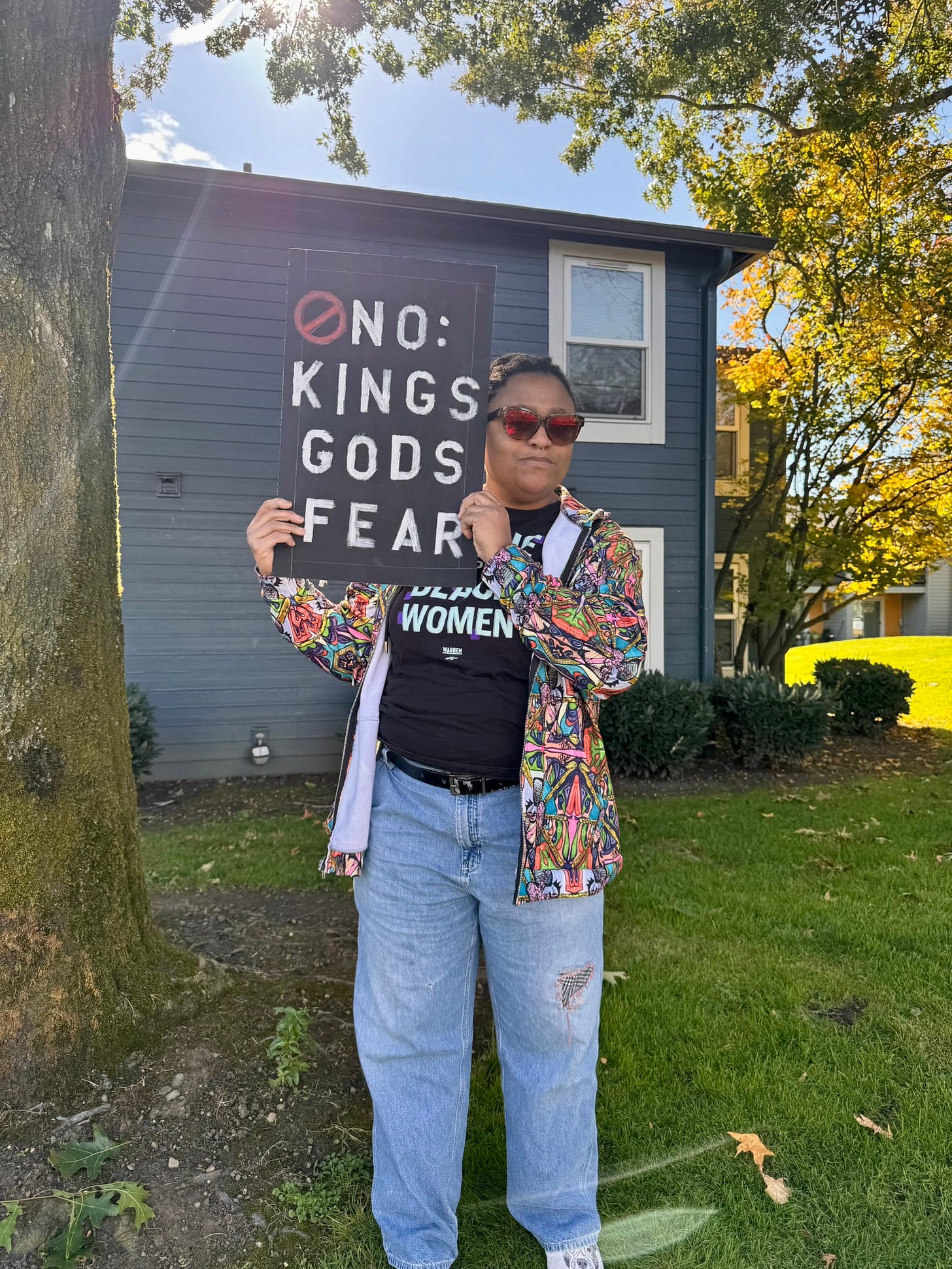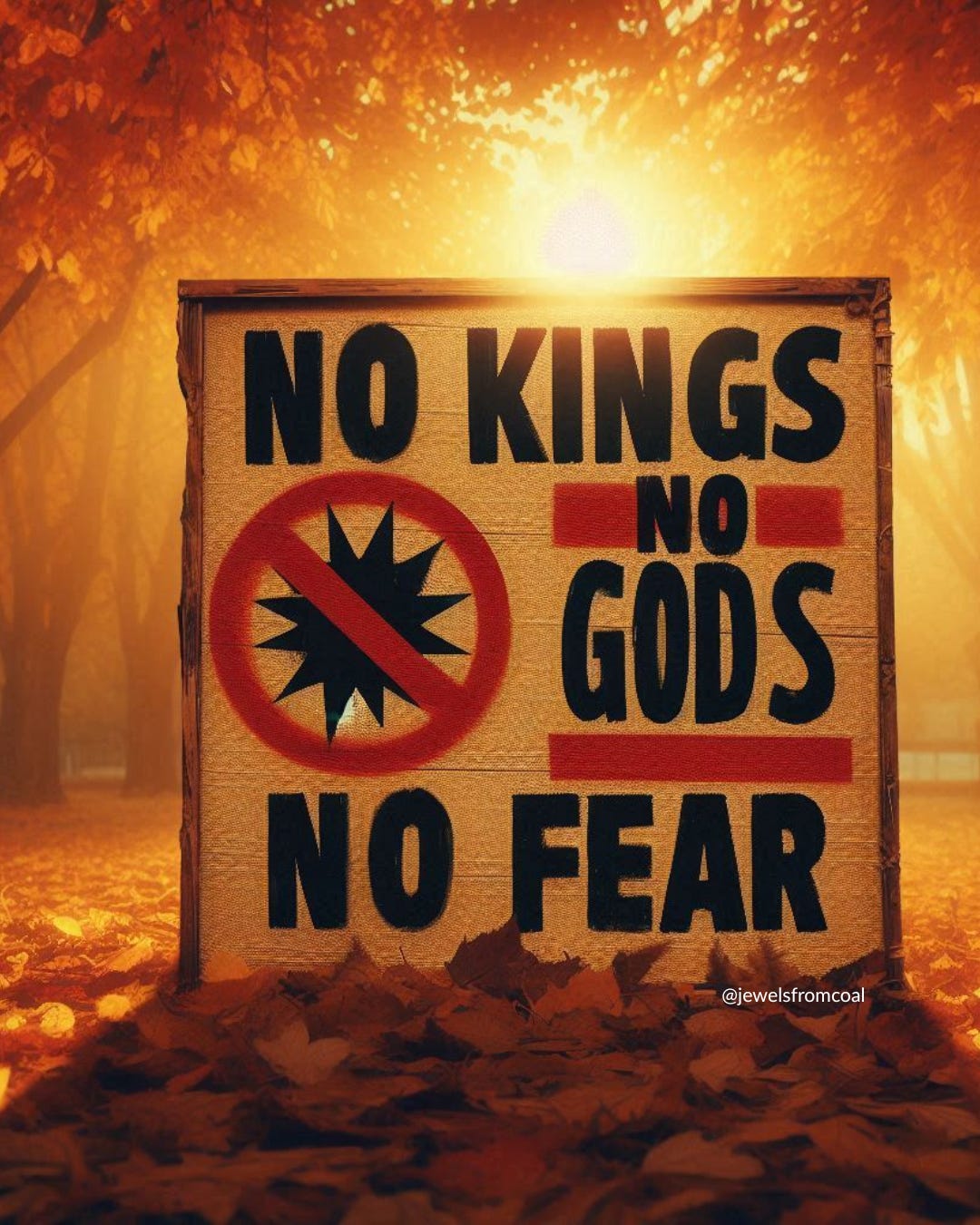Neurodivergent Gumbo #11
The Feral March: No Kings, No Gods, No Fear

No Kings. No Gods. No Fear.
I didn’t really want to go.
I wanted to want to go.
But the truth is, I’ve gone a little feral in my time away from the public—half hermit, half wild thing. My comfort zone has shrunk to the soft circumference of my couch, my wife, our dog, and whatever book or idea has its claws in me that day. Crowds make me twitchy now. The idea of chanting in unison with strangers feels both holy and unbearable.
Still, two nights ago, I said yes.
We decided we’d show up for the No Kings protest. That gave me time to make a sign, which felt like an act of summoning. I wanted something clever, something that looked like it belonged next to Amy’s — she’d already decided on Empathy Over Oligarchy. But more than that, I wanted something that sounded like me.
I started with the classic: No Kings. No Gods. No Masters.
It felt right — until I realized Masters wouldn’t fit on my board. Too long, too heavy, too much to carry. So I swapped it for Fear.
It wasn’t the line I planned, but maybe that was the point. Maybe every revolution, personal or political, starts with what you can carry.
So I painted the words in white, drew a red prohibition sign next to the words, and got my good walking shoes out. It wasn’t courage exactly — more like curiosity with a side of caffeine. Two cups of coffee, no breakfast — just me, my wife, and a sign that said more about my nervous system than I intended.
Then we left the house. The air was bright and crisp—a fall morning with no hint of rain, everything feeling slightly too alive. By the time we turned onto the main road, the sound of the crowd reached us first — car horns, chants, drums, laughter. It hit my body before my brain — vibration first, understanding later. And just like that, I remembered what movement feels like.
Arrival – The Sound of Collective Nerve
People moved like a slow, continuous river along the sidewalk, looping the same hundred-yard stretch again and again — a current of color, sound, and purpose.
We found parking nearby and doubled back toward the main road, settling into a patch of grass under some trees just off the main flow — a good spot to people-watch without getting swallowed by it.
Once we raised our signs, the world shifted. It wasn’t just noise — it was an explosion of energy. Chants and the occasional tambourine collided with the low hum of engines. Horns punctuated the rhythm like exclamation points. People moved in waves, circling the intersections in a kind of messy choreography that only made sense from within it.
There were banners and T-shirts and kids with handmade cardboard signs, wagons pulled by little old ladies filled with snacks and water bottles, and dogs trotting happily beside their people. Every few seconds, another car honked in solidarity, and the crowd responded like a single organism — one heartbeat stretched across a dozen city blocks. I truly would have fallen out if someone blared ‘We’re Not Gonna Take It,’ but ‘FDT’ was a great alternate.
We stood beneath the trees, holding our signs, my sign catching the light just enough to make the red circle flash. No: Kings. Gods. Fear. For a moment, I didn’t feel awkward or out of place. I felt connected, plugged in. Like the chaos itself had made room for me.

Reflection – The Body Keeps the Protest
After a while, though, the noise started pressing in; my nervous system trying to process everything at once — the bass of the chants, the pitch of horns and sirens, the overlapping voices bouncing off concrete and glass.
Amy noticed first, of course. She always does. She shifted closer, just enough to let our shoulders touch — that small grounding move that says I see you, I got you, breathe.
I hadn’t eaten, just fueled myself on coffee and adrenaline, so it all hit at once: joy, exhaustion, overstimulation, pride. Hope. I reminded myself that showing up doesn’t have to look like marching in circles for hours. Sometimes it’s standing still beneath the trees, holding a sign steady enough for someone else to see and feel less alone.
This wasn’t my first protest. My first was back in the eighties, during the nuclear arms rallies — the era of Cold War panic and denim jackets covered in buttons. Back then, it was all chanting and confrontation— lie-ins to stop traffic and make a statement. The anger was louder than the analysis.
Now, the energy feels different. There’s still outrage, yes, but also intention. Less demonstration, more thought. People talk to each other between chants. There’s room for reflection, for intersection, for complexity.
And maybe that’s what No Kings means now — not just rejecting power as domination, but redefining it as connection. Power as empathy. Power as awareness.
Closing – The Voice Remembers
We didn’t stay long. My body called time before my mind was ready, and that’s okay. We said what we came to say, even if it was in stillness. Our signs caught the light, our voices joined the chant, and for a brief moment the current of resistance carried us with it.
Driving home, the adrenaline began to fade, leaving that familiar hum — the one that comes after any act of truth-telling. I thought about how every protest leaves an echo in the body, a small vibration that lingers long after the crowd disperses. It’s not just about who we shout at. It’s about who we become when we remember that our voices still work.
“No Kings. No Gods. No Fear.” Words that still ring in my skull as I type this.
Words about unlearning obedience; freeing the mind from the myth that someone else should be in charge of our humanity.
Maybe that’s the new shape of protest — less about volume, more about vibration. Less about spectacle, more about staying aware.
And maybe, in that way, we’re all still marching.💎


